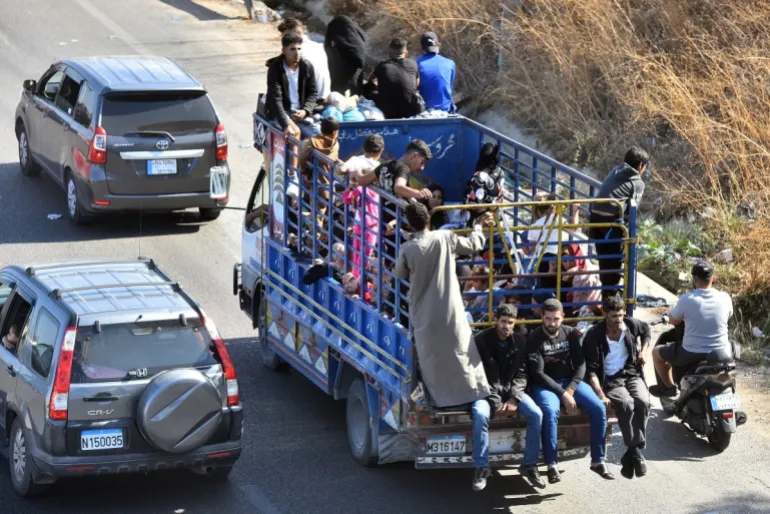
People sit with their belongings in the back of a truck as they arrive in the coastal town of Naameh, south of Lebanon’s capital, Beirut [Fadel Itani/AFP]
Beirut, September 24 (RHC)-- Israel and Hezbollah are trading fire a day after the Israeli military launched a wave of air strikes into Lebanon that killed more than 500 people and fanned fears of an all-out war.
Hezbollah said on Tuesday that it launched a barrage of rockets against Israeli air bases, including the Megiddo airfield near northern Afula, and on an explosives factory about 60km (37 miles) into Israel. The Iron Dome missile defence system intercepted most of the salvos which caused minimal damage, the Israeli army said.
More than 50 projectiles were fired from Lebanon into northern Israel on Tuesday, the Israeli military said, and the majority “were intercepted”. No casualties were reported. It also said that it targeted “dozens of Hezbollah targets in several areas in southern Lebanon” overnight.
The new strikes came after Israel said it launched more than 1,600 projectiles into Lebanon on Monday, first hitting areas in southern Lebanon and then expanding its bombardment to the Bekaa Valley in the country’s east, in what is the largest flareup of violence since their last war in 2006.
Lebanon’s Ministry of Public Health said on Tuesday that the air attacks killed 558 people, including 50 children and 94 women, and wounded at least 1,835 others.
The strikes drew global condemnation and calls for de-escalation as world leaders meet in New York for the United Nations General Assembly.
Tens of thousands of people were forced from their homes on Monday and overnight “and the numbers continue to grow”, UN refugee agency (UNHCR) spokesman Matthew Saltmarsh told reporters in Geneva on Tuesday, adding that “the toll on civilians is unacceptable”.
As people escaped the south of the country towards the capital, Beirut, highways were gridlocked through the night.
Schools were transformed into temporary shelters, while the Health Ministry asked medical staff to delay nonemergency cases to make space for the wounded.
Nasser Yassin, the minister coordinating the crisis response, told the Reuters news agency that 89 temporary shelters were set up in schools and other facilities and they could house more than 26,000 people who have fled “Israeli atrocities”.
Lebanon’s civil defence tackled 176 fires caused by the Israeli strikes. It said it responded to blazes in agricultural land in Harf Miziara and Qartaba and in a landfill in Mashha, among others.
Minister of Health Firass Abiad said the Israeli air strikes targeted medical centres, ambulances and the cars of people trying to escape. The attack sent shockwaves in the country and beyond.
More than 30 international flights to and from Beirut were cancelled, according to the Rafic Hariri international airport’s website.
Qatar Airways said it has suspended flights to and from Beirut until Wednesday. Germany’s Lufthansa, Air France and Delta Air Lines of the United States have also suspended flights to Beirut in recent days with some carriers’ services to Israel and Iran also affected.
The near-daily, cross-border fighting between the Israeli military and the Lebanese armed group since Israel launched its war on Gaza in October has displaced tens of thousands of residents on both sides.
It escalated after thousands of pagers and walkie-talkies exploded across Lebanon last week in attacks also blamed on Israel. Close to 40 people were killed and nearly 3,000 maimed and injured, including women and children, in those explosions. Israel has neither denied the attack nor claimed responsibility for it.
On Friday, Israel struck Beirut’s southern suburbs killing 59 people, including Hezbollah’s second-in-command of the group’s armed wing, Ibrahim Aqil.
Asked whether the army is considering a ground invasion into Lebanon, Israeli army spokesperson Daniel Hagari told reporters on Monday: “We will do everything necessary to return the residents of the north to their homes safely.”
Critics argue that Monday’s assault could have been prevented and Israeli residents could have returned to the north as Hezbollah has said it would stop attacking northern Israel should a ceasefire in Gaza be reached.
“Israel was not ready to put an end to the war in Gaza, so here we are now in another war on a very big scale,” Gideon Levy, a columnist with Israeli newspaper Haaretz, told Al Jazeera.

